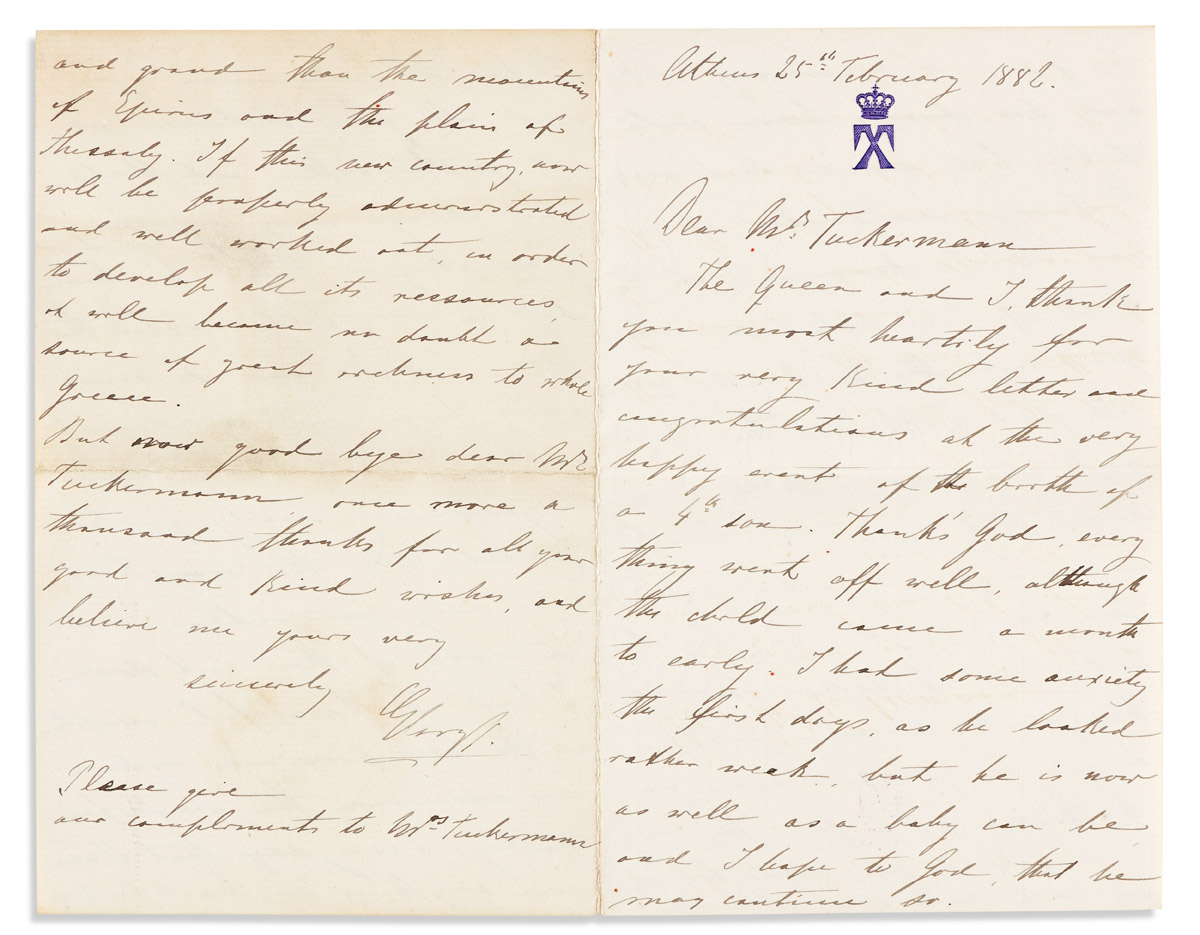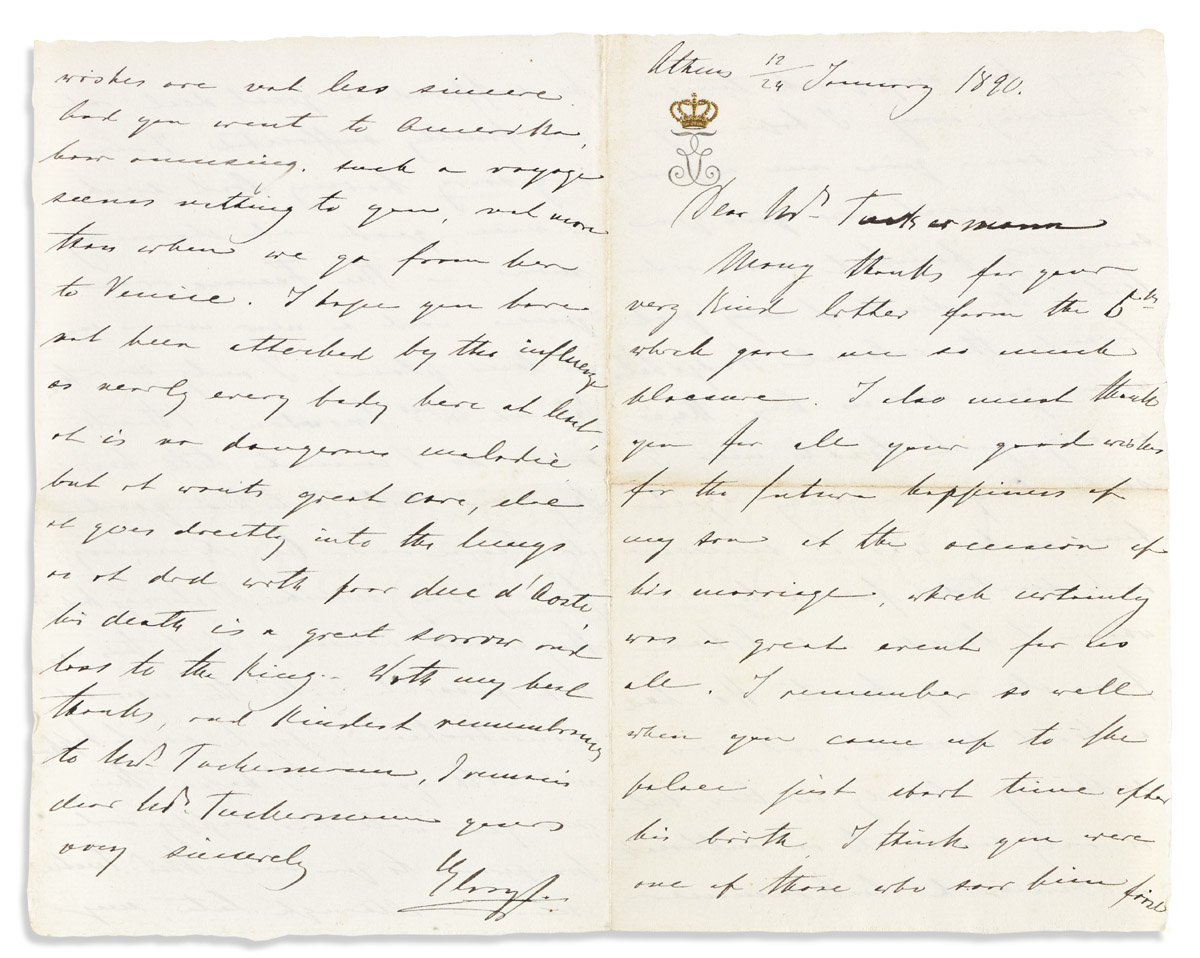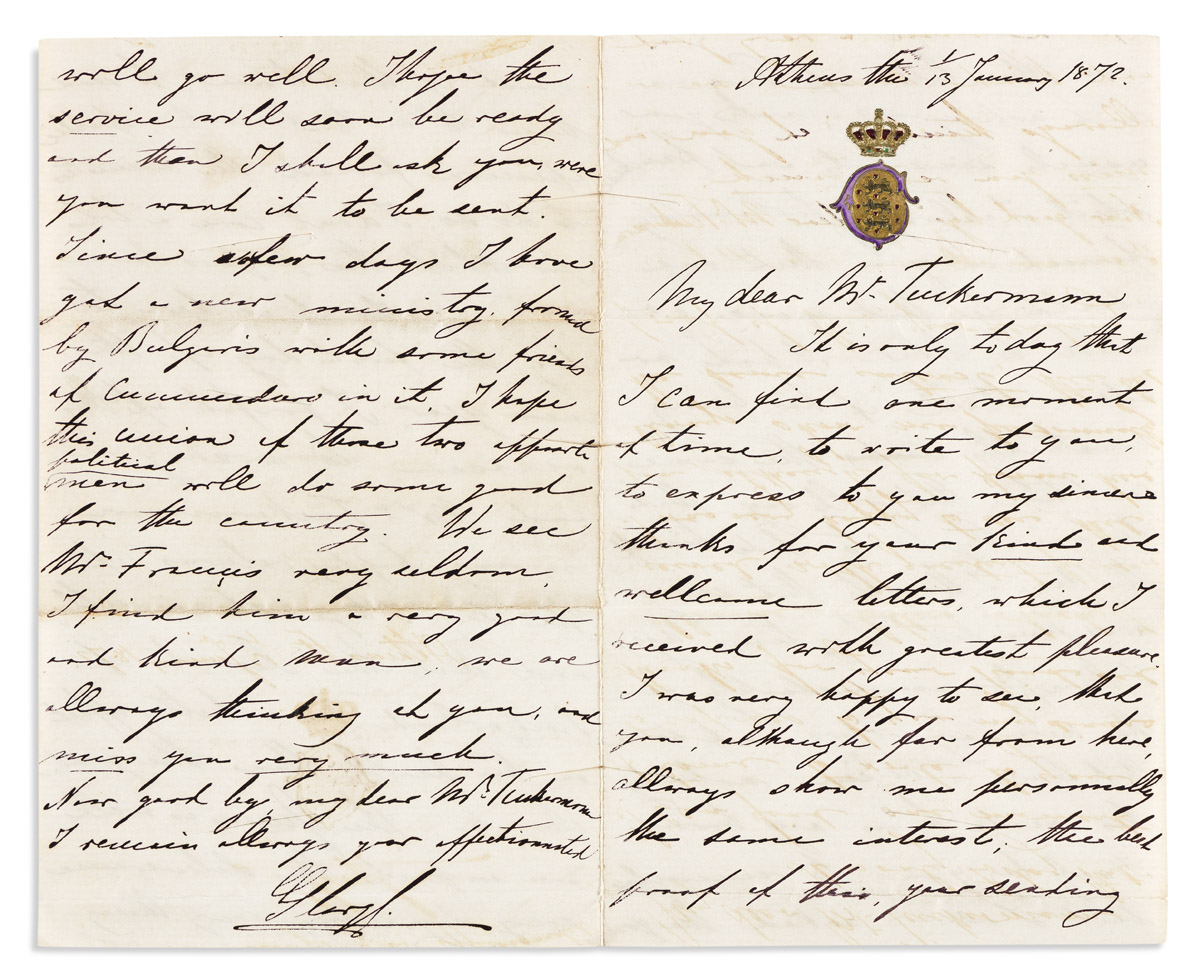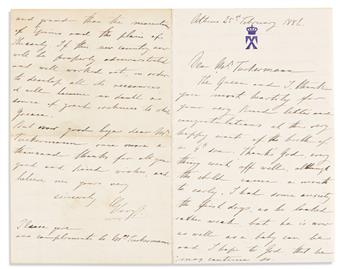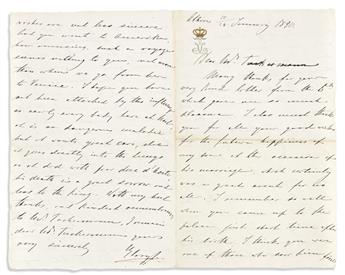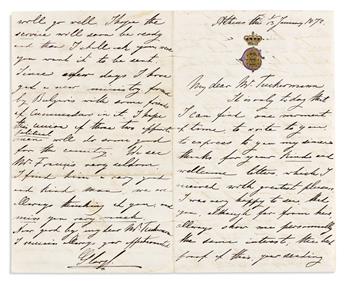Sale 2584 - Lot 29
Price Realized: $ 3,600
Price Realized: $ 4,500
?Final Price Realized includes Buyer’s Premium added to Hammer Price
Estimate: $ 1,200 - $ 1,800
KING'S CORRESPONDENCE WITH U.S. AMBASSADOR TO GREECE GEORGE I; KING OF GREECE. Archive of 15 Autograph Letters Signed, "George," as King, and a fragmentary Autograph Letter, unsigned, to diplomat Charles K. Tuckerman, in English, on political and personal topics. Together 65 pages. 8vo or smaller, few on monogrammed stationery, most written on folded sheets; few with minor chipping to edges, generally good condition. Vp, 1872-95
Additional Details
13 January 1872: ". . . I have got a new ministry, formed by Bulgaris [Dimitrios Voulgaris?] with some friends of Cumunduro [Alexandros Koumoundouros?] in it. I hope this union of those two opposite political men will do some good for the country. . . ."
28 December 1872: ". . . The Laurion affair [dispute with France over Laurion mines] is not settled yet; that is a rather dirty affair. There is lots of interest in it. They want to make Greece un pays d'exploration, where everybody can come and take what he likes. . . ."
31 March 1873: ". . . I have seen several Americans here in these last days, between which a general and a member of the Congress. . . . I forgot the name of this last one, but I was very much pleased in making his acquaintance; they say that he is a good friend of your President. . . .
". . . You will be sorry to learn poor old Professor Koeppen's death [Adolph Ludvig Køppen, Danish scholar of historical geography]; he died the 29th of April. . . ."
3 January 1877: ". . . I think the new President must have been elected now; an immense antagonisme existed this time between the two parties [the 1876 U.S. presidential election was the second in which the victor lost the popular vote]. . . ."
25 January 1879: ". . . Our commissioners are now 14 days in Prevenza. They hope to be able to begin the discution [sic] tomorrow. We'll se[e] now if really Muktar Pascha [Ahmed Muhtar Pasha] is inclined to do so. . . . Turkey has shown so much bad will in all this case that . . . they will find all sorts of difficulties in order to prevent the quick settlement of the question. Ioannina is the great difficulty, although I do not understand why Turkey wants to keep that town, while I perfectly well understood why we must insist upon having it. Le berceau de l'hellénisme et de l'indépendance Grecque! [The cradle of Hellenism and Greek indepenence!] What should Greece do with Epirus without Ioannina, a body without a soul! . . . I cannot believe, that the powers, who agreed and ratified this treaty of Berlin, would do otherwise, than insist upon its being entirely executed by all, and in every detail. If it is to be permitted for Turkey only to execute some of that and to give to Greece only a part of that . . . then there would not be any plausible reason for others not to do the same. . . ."
3 October 1885: ". . . It is a very serious moment for the East; things might have been put right again . . . after the coup de main had happened in Philippopolis; but what was possible then, is impossible now. It is therefore to be hoped that Greece won't be forgotten, and the claims of her nation and people won't be overseen [overlooked]. England supports the union of East Rumelia with Bulgaria . . . why should not she also support the Greek claims? . . ."
18 March 1891, incomplete: ". . . I, as well as the government ([former prime minister Charilaos] Trikoupis), were very thankful to the secretary of state Mr. [James G.] Blaine for the kind interest he took in this matter . . . ."
25 April 1895: ". . . It is indeed very kind of you . . . to excite an interest in the Olympic Games, and to induce the sporting clubs to send representations to Athens to take part in the performances. I told it all to my son . . . . He . . . works zealously to make the affair a success. But there is enormously [much] to do, and a good many difficulties . . . . "
With--(George I; King of Greece.) Two manuscript copies of documents, unsigned and in unknown hand, each discharging Charles K. Tuckerman from his diplomatic post, in French. Np, circa 1871.
28 December 1872: ". . . The Laurion affair [dispute with France over Laurion mines] is not settled yet; that is a rather dirty affair. There is lots of interest in it. They want to make Greece un pays d'exploration, where everybody can come and take what he likes. . . ."
31 March 1873: ". . . I have seen several Americans here in these last days, between which a general and a member of the Congress. . . . I forgot the name of this last one, but I was very much pleased in making his acquaintance; they say that he is a good friend of your President. . . .
". . . You will be sorry to learn poor old Professor Koeppen's death [Adolph Ludvig Køppen, Danish scholar of historical geography]; he died the 29th of April. . . ."
3 January 1877: ". . . I think the new President must have been elected now; an immense antagonisme existed this time between the two parties [the 1876 U.S. presidential election was the second in which the victor lost the popular vote]. . . ."
25 January 1879: ". . . Our commissioners are now 14 days in Prevenza. They hope to be able to begin the discution [sic] tomorrow. We'll se[e] now if really Muktar Pascha [Ahmed Muhtar Pasha] is inclined to do so. . . . Turkey has shown so much bad will in all this case that . . . they will find all sorts of difficulties in order to prevent the quick settlement of the question. Ioannina is the great difficulty, although I do not understand why Turkey wants to keep that town, while I perfectly well understood why we must insist upon having it. Le berceau de l'hellénisme et de l'indépendance Grecque! [The cradle of Hellenism and Greek indepenence!] What should Greece do with Epirus without Ioannina, a body without a soul! . . . I cannot believe, that the powers, who agreed and ratified this treaty of Berlin, would do otherwise, than insist upon its being entirely executed by all, and in every detail. If it is to be permitted for Turkey only to execute some of that and to give to Greece only a part of that . . . then there would not be any plausible reason for others not to do the same. . . ."
3 October 1885: ". . . It is a very serious moment for the East; things might have been put right again . . . after the coup de main had happened in Philippopolis; but what was possible then, is impossible now. It is therefore to be hoped that Greece won't be forgotten, and the claims of her nation and people won't be overseen [overlooked]. England supports the union of East Rumelia with Bulgaria . . . why should not she also support the Greek claims? . . ."
18 March 1891, incomplete: ". . . I, as well as the government ([former prime minister Charilaos] Trikoupis), were very thankful to the secretary of state Mr. [James G.] Blaine for the kind interest he took in this matter . . . ."
25 April 1895: ". . . It is indeed very kind of you . . . to excite an interest in the Olympic Games, and to induce the sporting clubs to send representations to Athens to take part in the performances. I told it all to my son . . . . He . . . works zealously to make the affair a success. But there is enormously [much] to do, and a good many difficulties . . . . "
With--(George I; King of Greece.) Two manuscript copies of documents, unsigned and in unknown hand, each discharging Charles K. Tuckerman from his diplomatic post, in French. Np, circa 1871.
Exhibition Hours
Exhibition Hours
Aliquam vulputate ornare congue. Vestibulum maximus, libero in placerat faucibus, risus nisl molestie massa, ut maximus metus lectus vel lorem.



